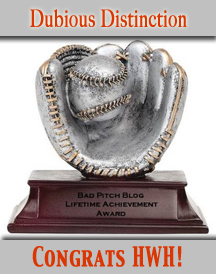Monday, September 8
Branding Shift: Microsoft?
Author: Rich
| Posted at: 3:51 PM |
Filed Under:
advertising,
branding,
microsoft
Friday, September 5
Claiming All Confetti: Sprinkles Cupcakes
Author: Rich
| Posted at: 3:35 PM |
Filed Under:
branding,
case study,
public relations,
Sprinkles
The next time your read a recipe that calls for sprinkles on top of a cupcake, it might be a recipe for disaster. At least that’s what the legal eagles charged with defending the name of a three-year-old “cupcake only” shop in Beverly Hills thinks.
According to the Los Angeles Times, Sprinkles has sent about a dozen letters to shops around the country and filed three lawsuits, including one last month against Famous Cupcakes in North Hollywood because it too uses dots on its packaging and in its store.
But what’s so odd about warning away other small businesses from using candy, dots, and other decorations is that Sprinkles doesn’t even use dots all that much in its identity or on its Web site. In fact, it seems to me that few, if any, of the cupcake bakeries have any similarity in their presentation. See for yourself: Sprinkles Cupcakes, Sprinkled Pink Cupcake Couture, and Famous Cupcakes.
Sure, I’m not an attorney, but I do know enough about trademarks to understand no one can claim common symbols or words like sprinkles. I also know my grandmother used to adorn her cupcakes with a candy corn at the end of every October and Necco Wafers whenever it struck her. She had taken the idea from a small neighborhood bakery in the Midwest.
So when you add it all up, whatever Sprinkles Cupcakes thinks it can gain from flirting with legal action against other bakeries will be lost to bad public relations. And it might become worse than that.
Beyond looking greedy or silly or petty or all of the above, these lawsuits could run the risk of the company having its own identity challenged. After all, Sprinkles Custom Cakes has held sprinkles.com since 1997. Since trademarks are based on first published usage, not first registration filed, sprinkles.com or any other bakery that has happened to use sprinkles in their name might do the same.
Conversely, if Sprinkles loses even one lawsuit, it’s likely more bakeries will be adding “sprinkles” to their names; not fewer as the owners of Sprinkles Cupcakes had hoped. It’s already on the radar. [Hat tip: Spin Thicket.]

According to the Los Angeles Times, Sprinkles has sent about a dozen letters to shops around the country and filed three lawsuits, including one last month against Famous Cupcakes in North Hollywood because it too uses dots on its packaging and in its store.
But what’s so odd about warning away other small businesses from using candy, dots, and other decorations is that Sprinkles doesn’t even use dots all that much in its identity or on its Web site. In fact, it seems to me that few, if any, of the cupcake bakeries have any similarity in their presentation. See for yourself: Sprinkles Cupcakes, Sprinkled Pink Cupcake Couture, and Famous Cupcakes.
Sure, I’m not an attorney, but I do know enough about trademarks to understand no one can claim common symbols or words like sprinkles. I also know my grandmother used to adorn her cupcakes with a candy corn at the end of every October and Necco Wafers whenever it struck her. She had taken the idea from a small neighborhood bakery in the Midwest.
So when you add it all up, whatever Sprinkles Cupcakes thinks it can gain from flirting with legal action against other bakeries will be lost to bad public relations. And it might become worse than that.
Beyond looking greedy or silly or petty or all of the above, these lawsuits could run the risk of the company having its own identity challenged. After all, Sprinkles Custom Cakes has held sprinkles.com since 1997. Since trademarks are based on first published usage, not first registration filed, sprinkles.com or any other bakery that has happened to use sprinkles in their name might do the same.
Conversely, if Sprinkles loses even one lawsuit, it’s likely more bakeries will be adding “sprinkles” to their names; not fewer as the owners of Sprinkles Cupcakes had hoped. It’s already on the radar. [Hat tip: Spin Thicket.]
Thursday, September 4
Making Noise: Boston Herald
Do newspaper publishers ever consider that stories like this might be the result of stories like this? [Hat tip: Steven Silvers]
Wednesday, September 3
Branding Employees: Chapel vs. Dell
Author: Rich
| Posted at: 8:05 PM |
Filed Under:
Amanda Chapel,
blogs,
branding,
ceo blogs,
Dell,
internal communication,
message management,
reputation management,
social media,
Twitter
While Tamera Kremer at Wildfire was covering the debate between RichardatDell and the fictional AmandaChapel on the value of making brand ambassadors out of employees, Adweek was covering Zappos.com. Zappos has already moved full steam ahead and is one of many companies that already consider employees brand ambassadors online.
In fact, according to the story, the vast majority of trial and repeat business at Zappos.com is driven by word of mouth and employees. Brian Kalma, director of creative services and brand marketing, employs the term "people planning," arguing that each employee needs to be a great point of contact with customers.
Indeed. So where is the debate?
Based on the comments on Wildfire, it seems Chapel was taking the position that “front-line folks that you’ve assigned to the ‘conversation’ on Dell’s behalf, particularly your Twitter social-media team, are making a complete mess of it.”
Richard has defended the Dell position by saying “We believe that social media helps us foster direct relationships, not just transactions with our customers. Think about your own customer relationships and to what extent they rely on the personal and professional interactions that you have.”
Amazingly, the debate seems to have some social media participants questioning the need to distinguish personal and professional brands online, a notion that seems contradictory to any sense of transparency that social media practitioners claim is critical to success. As I noted on Twitter, "trying to separate personal and professional brands is like arguing that you are a different person when you wear jeans or a suit." We can pretend people are somehow different, but it’s really not true.
Still, that is not to say employees acting as brand ambassadors can enjoy a free-for-all online. Common sense suggests if you wouldn’t say something to a customer offline, it’s probably a good idea to avoid saying it online, where it can be archived forever.
Look offline for online behavior guides.
This isn’t rocket science. The best companies already know that employees tend to be the best brand ambassadors, provided the company benefits from a strong internal communication program.
One of the examples I frequently share in explaining the impact of external public relations on internal audiences is how two different utility rate cases turned out. Without sharing the specifics here, one company started with a proactive internal communication program so by the time the rate case hit the papers, employees could explain the reasons behind the rate increase with friends, family, and neighbors. The other did not. The results were dramatically different, with one rate increase succeeding and other quickly turning into a crisis.
My point is simple enough. Front line employees have always been brand ambassadors. It’s not a new concept. So maybe the real question is: do companies realize blogging is front line communication and are they educating their employees well enough for them to deliver a return? Apparently, Zappos does.

In fact, according to the story, the vast majority of trial and repeat business at Zappos.com is driven by word of mouth and employees. Brian Kalma, director of creative services and brand marketing, employs the term "people planning," arguing that each employee needs to be a great point of contact with customers.
Indeed. So where is the debate?
Based on the comments on Wildfire, it seems Chapel was taking the position that “front-line folks that you’ve assigned to the ‘conversation’ on Dell’s behalf, particularly your Twitter social-media team, are making a complete mess of it.”
Richard has defended the Dell position by saying “We believe that social media helps us foster direct relationships, not just transactions with our customers. Think about your own customer relationships and to what extent they rely on the personal and professional interactions that you have.”
Amazingly, the debate seems to have some social media participants questioning the need to distinguish personal and professional brands online, a notion that seems contradictory to any sense of transparency that social media practitioners claim is critical to success. As I noted on Twitter, "trying to separate personal and professional brands is like arguing that you are a different person when you wear jeans or a suit." We can pretend people are somehow different, but it’s really not true.
Still, that is not to say employees acting as brand ambassadors can enjoy a free-for-all online. Common sense suggests if you wouldn’t say something to a customer offline, it’s probably a good idea to avoid saying it online, where it can be archived forever.
Look offline for online behavior guides.
This isn’t rocket science. The best companies already know that employees tend to be the best brand ambassadors, provided the company benefits from a strong internal communication program.
One of the examples I frequently share in explaining the impact of external public relations on internal audiences is how two different utility rate cases turned out. Without sharing the specifics here, one company started with a proactive internal communication program so by the time the rate case hit the papers, employees could explain the reasons behind the rate increase with friends, family, and neighbors. The other did not. The results were dramatically different, with one rate increase succeeding and other quickly turning into a crisis.
My point is simple enough. Front line employees have always been brand ambassadors. It’s not a new concept. So maybe the real question is: do companies realize blogging is front line communication and are they educating their employees well enough for them to deliver a return? Apparently, Zappos does.
Tuesday, September 2
Earning Distinction: HWH PR
Author: Rich
| Posted at: 11:26 AM |
Filed Under:
Bad Pitch Blog,
Dotster,
MyClick,
public relations,
publicity,
Samsung,
Westinghouse Digital
HWH PR was apparently awarded the Bad Pitch Blog Lifetime Achievement Award for the worst in public relations yesterday. This dubious distinction comes after two years of spamming bloggers, journalists, and anyone else who might be unfortunate enough to make their mass blast email list.
The Bad Pitch Blog sums up its assessment as “Blasting news releases to anyone with an email address and ignoring their replies is not practicing media relations – it’s spamming.” Case in point, HWH PR is the one reason I won’t write anything about MyClick technology and everything about MyClick’s inability to hire a public relations firm that knows what they are doing.
Even after writing a post that outlined several shortcomings of the so-called public relations firm (without naming it) and asking to be removed from all future pitches, HWH PR continues to send me one poorly written pitch after another, with the most recent from Lois Whitman landing in my spam folder just last month. The release is nothing more than an embarrassing exercise in turning client news into non-news:
Visitors to China Mobile’s Pavilion at the Beijing 2008 Olympic Games Exhibition are experiencing MyClick’s unique breakthrough image-matching technology. The MyClick technology allows visitors to access instant information and pass on their best wishes to the Olympic Games with just a few clicks on their mobile phones.
One would think even a first year student of public relations would be able to find some semblance of a news story for an upstart company landing some space at the Olympics, but not HWH PR. They trivialize any hope of a hook to the point of absurdity. Even if I could have salvaged the story for them, I already know that it is a complete waste of time to contact this firm.
They have no idea who they send pitches to and don’t want to be bothered by the people they pitch. It’s about that simple. Other HWH PR “spam, don’t speak” clients include Samsung, Westinghouse Digital, and Dotster.

The Bad Pitch Blog sums up its assessment as “Blasting news releases to anyone with an email address and ignoring their replies is not practicing media relations – it’s spamming.” Case in point, HWH PR is the one reason I won’t write anything about MyClick technology and everything about MyClick’s inability to hire a public relations firm that knows what they are doing.
Even after writing a post that outlined several shortcomings of the so-called public relations firm (without naming it) and asking to be removed from all future pitches, HWH PR continues to send me one poorly written pitch after another, with the most recent from Lois Whitman landing in my spam folder just last month. The release is nothing more than an embarrassing exercise in turning client news into non-news:
Visitors to China Mobile’s Pavilion at the Beijing 2008 Olympic Games Exhibition are experiencing MyClick’s unique breakthrough image-matching technology. The MyClick technology allows visitors to access instant information and pass on their best wishes to the Olympic Games with just a few clicks on their mobile phones.
One would think even a first year student of public relations would be able to find some semblance of a news story for an upstart company landing some space at the Olympics, but not HWH PR. They trivialize any hope of a hook to the point of absurdity. Even if I could have salvaged the story for them, I already know that it is a complete waste of time to contact this firm.
They have no idea who they send pitches to and don’t want to be bothered by the people they pitch. It’s about that simple. Other HWH PR “spam, don’t speak” clients include Samsung, Westinghouse Digital, and Dotster.
Monday, September 1
Creating An Industry, Or Not: Social Media
Author: Rich
| Posted at: 10:56 AM |
Filed Under:
advertising,
public relations,
social media
J.W. Sass, vice president of business development with Myxer, seemingly inspired by “The Future of Social Media: Hope or Hype?” by Jason Falls, wrote his own post declaring “Social Media is NOT an Industry.” Sass further expands on the idea in his comments, saying that social media is core communication, a sharing and feedback process widely used for both personal and business exchanges, internally and externally.
He might be right. Maybe social media is not an industry.
It might be emerging as a field of specialization, which addresses Falls’ comment that “… I do think there will always be specialists, always be conferences, always be professional development groups and opportunities relative to social media and, thus, there will be an "industry" around it. But until social media, the practice or the tools, are ubiquitous and universal, there are people (like me) who make a living doing it. Thus, an industry does exist.” Possibly, but probably not.
Sure, we could take the broadest definition of an industry — the category describing a company's primary business activity — and make it stick. But we could apply that definition to any number of services and claim those are industries too, even if they are not.
Writing, for example, is generally not considered an industry even though it also passes the broadest definition. Instead, writing is generally assigned as something one does for another industry — advertising, publishing, film, etc. Likewise, graphic design is generally not regarded as an industry. Acting does not seem to be an industry unto itself. Web site development isn’t really an industry.
For social media to become an industry, I imagine it would have to demonstrate its fundamental uniqueness of service much like advertising did in the 1920s and public relations did in the 1950s. That seems unlikely to me as advertising, public relations, marketing, publishing, and even IT all have an increasing stake in it and communication continues to trend toward integration.
Does this preclude social media specialists? Not at all. Does this censor some experts from promoting it as an industry? Absolutely not. Does it mean mainstream media will eventually succumb to being part of something it once loathed, simply because it moved into this space as its most viable means of self-presevation? Yeah, right.
But there is something else. Does social media even want to grow up into its own industry? After all, becoming an industry usually involves corralling a discipline, which almost seems contrary to the freedoms that seem to be pushing it forward.

He might be right. Maybe social media is not an industry.
It might be emerging as a field of specialization, which addresses Falls’ comment that “… I do think there will always be specialists, always be conferences, always be professional development groups and opportunities relative to social media and, thus, there will be an "industry" around it. But until social media, the practice or the tools, are ubiquitous and universal, there are people (like me) who make a living doing it. Thus, an industry does exist.” Possibly, but probably not.
Sure, we could take the broadest definition of an industry — the category describing a company's primary business activity — and make it stick. But we could apply that definition to any number of services and claim those are industries too, even if they are not.
Writing, for example, is generally not considered an industry even though it also passes the broadest definition. Instead, writing is generally assigned as something one does for another industry — advertising, publishing, film, etc. Likewise, graphic design is generally not regarded as an industry. Acting does not seem to be an industry unto itself. Web site development isn’t really an industry.
For social media to become an industry, I imagine it would have to demonstrate its fundamental uniqueness of service much like advertising did in the 1920s and public relations did in the 1950s. That seems unlikely to me as advertising, public relations, marketing, publishing, and even IT all have an increasing stake in it and communication continues to trend toward integration.
Does this preclude social media specialists? Not at all. Does this censor some experts from promoting it as an industry? Absolutely not. Does it mean mainstream media will eventually succumb to being part of something it once loathed, simply because it moved into this space as its most viable means of self-presevation? Yeah, right.
But there is something else. Does social media even want to grow up into its own industry? After all, becoming an industry usually involves corralling a discipline, which almost seems contrary to the freedoms that seem to be pushing it forward.
Subscribe to:
Posts (Atom)




















